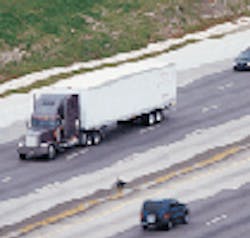While many inside and outside the trucking industry are pleased that the National Surface Transportation Policy and Revenue Study Commission finally addressed critical problems with the U.S. transportation infrastructure, much of the reaction is mixed over how the commission proposes to fix those concerns--especially when it comes to generating the necessary funding.
“They need to show us the money. Where it’s going, how it is being used, what are our true national needs, how the system is going to be cleaned up top to bottom,” said Todd Spencer, executive vp of the Owner-Operator Independent Drivers (OOIDA). “Then we’ll talk about paying more.”
OOIDA believes much more is needed in reforming the way money from the Highway Trust Fund is used, rather than raising fuel taxes or adding tolls to existing interstates. Spencer noted that the commission is proposing a 5% to 8% annual increase in the nation’s fuel taxes for the next five years to fund urgent transportation repairs
“Truckers pay enormous sums into the Highway Trust Fund, contributing as much as 36% of it, and deserve better than just ‘a new beginning,’ which really just means paying even more money,” he said.
There is dissention over funding within the commission itself, as the fuel tax increase measure was passed by a nine to three vote, with Secretary of Transportation Mary Peters among the dissenters. “Raising fuel taxes won’t improve traffic congestion, it will only perpetuate our ineffective reliance on fossil-based fuels to fund infrastructure and send more of Americans’ hard-earned money to Washington to be squandered on earmarks and special interest programs,” she said.
Thomas Donohue, president & CEO of the U.S. Chamber of Commerce, echoed the secretary’s concern. “When it comes to funding, every option must be considered to address the enormous problems of the aging transportation infrastructure. It is clear that chronic under-investment is a major contributing factor to the problems across all modes of transportation,” he said. “But the nation must also address rampant earmarking, misuse of funding, lack of resource prioritization, and poor comprehensive planning that marks current federal transportation programs.”
Even environmental groups are doubtful about the wisdom of pursuing fuel tax increases without first addressing other issues. Environmental Defense, for one, said it would be a mistake for Congress to boost gasoline taxes and other revenues for transportation investment without first adopting significant reforms to ensure sound transportation spending.
“America’s transportation system is broke and broken,” said Michael Replogle, the group’s transportation director and a former consultant to the Federal Highway Administration. “New revenues from gas tax increases, tolls, or public private partnerships won't solve transportation problems unless it’s clear what the goals are and unless the revenue measures, projects, and policies are designed to address them.”
About the Author
Sean Kilcarr
Editor in Chief
Sean Kilcarr is a former longtime FleetOwner senior editor who wrote for the publication from 2000 to 2018. He served as editor-in-chief from 2017 to 2018.
